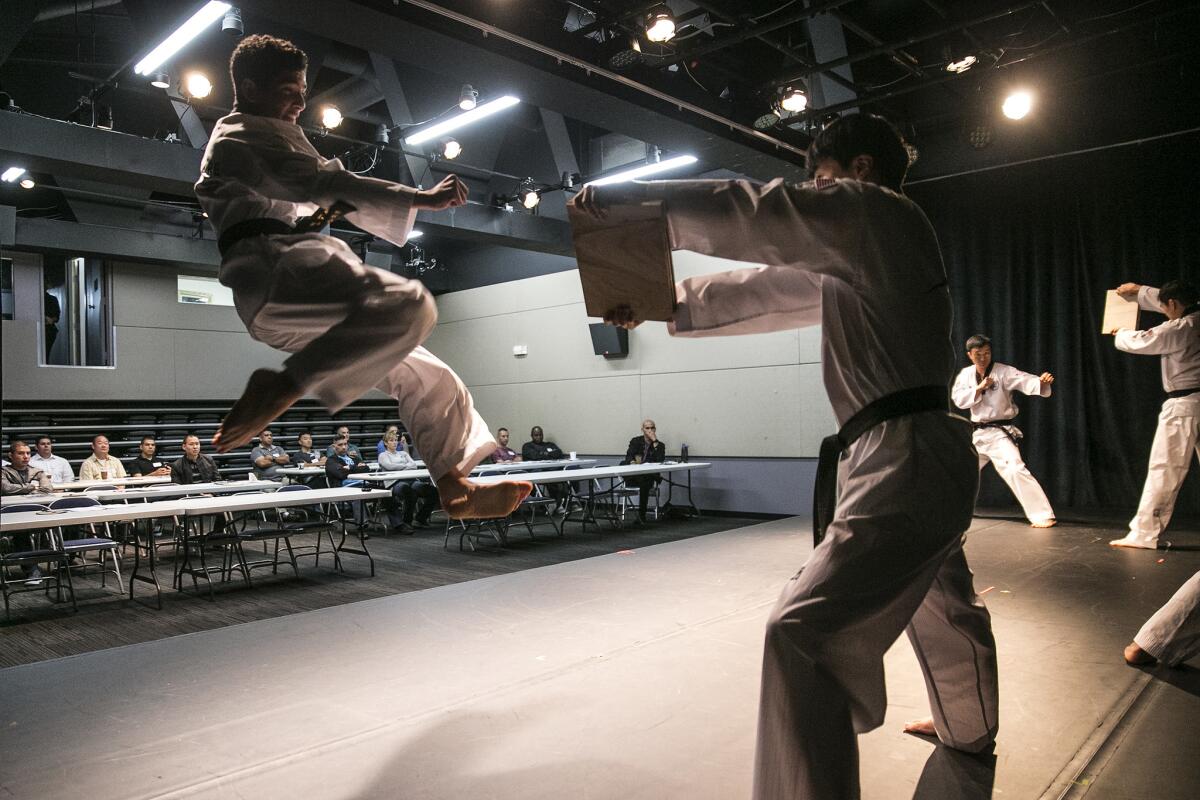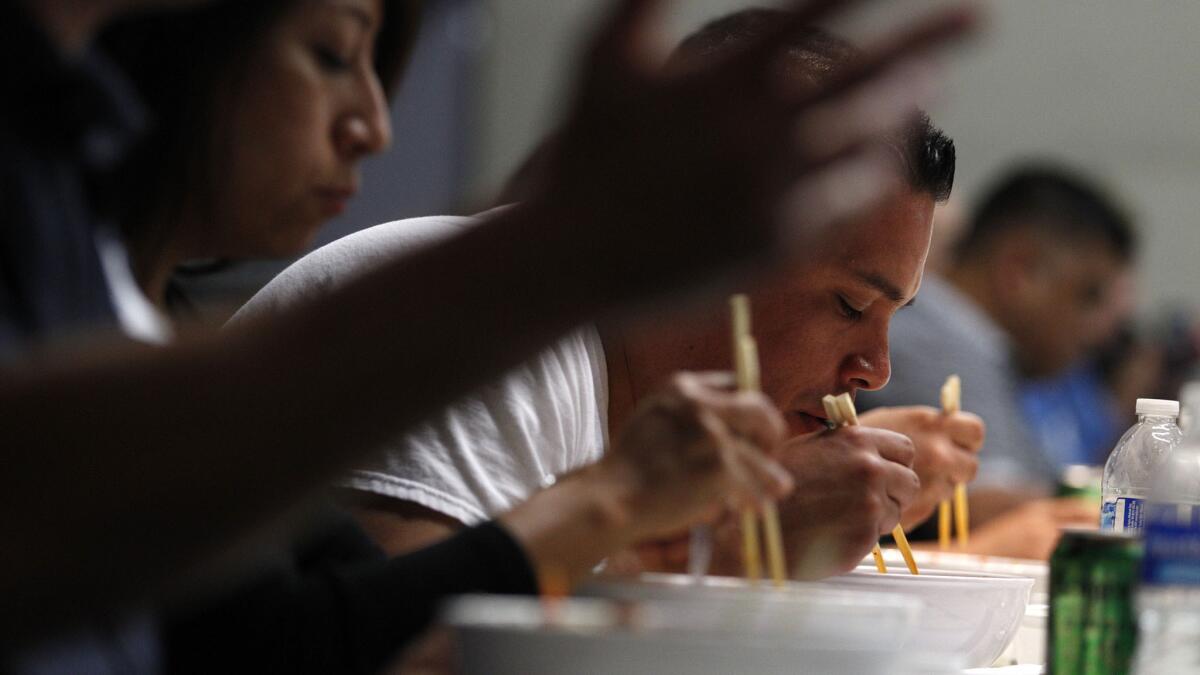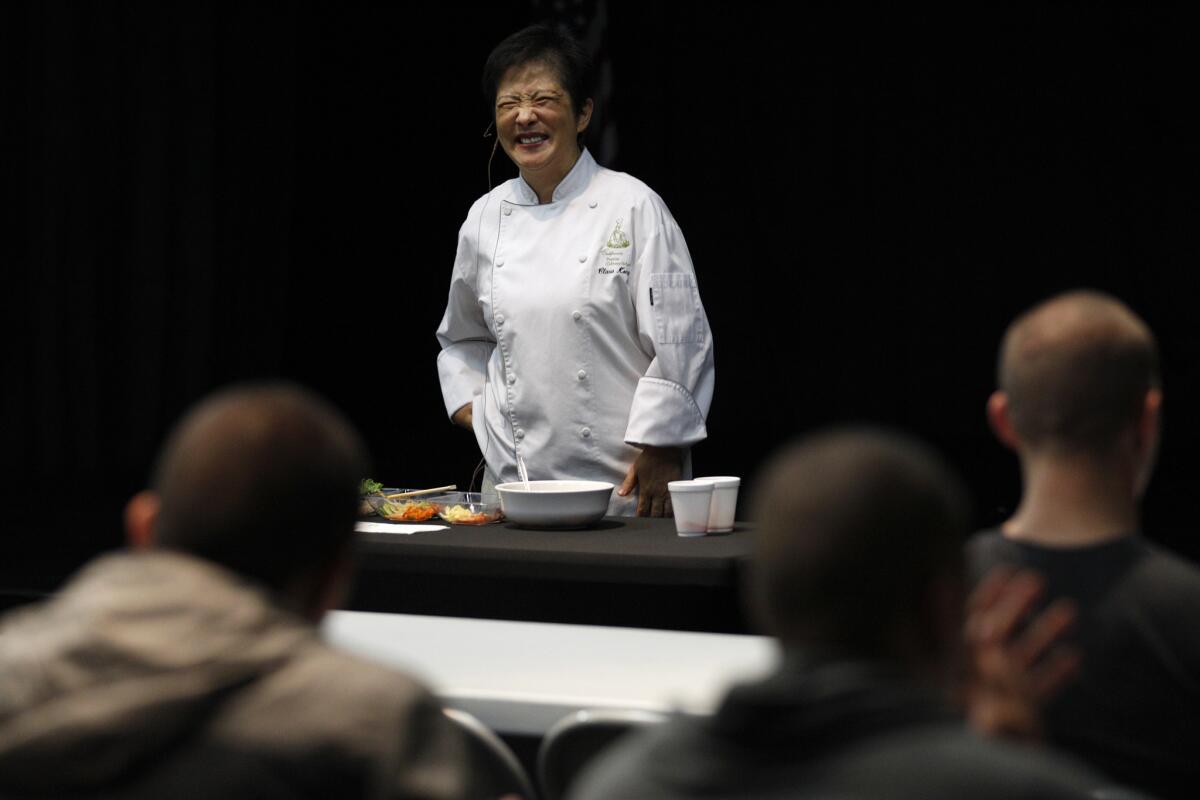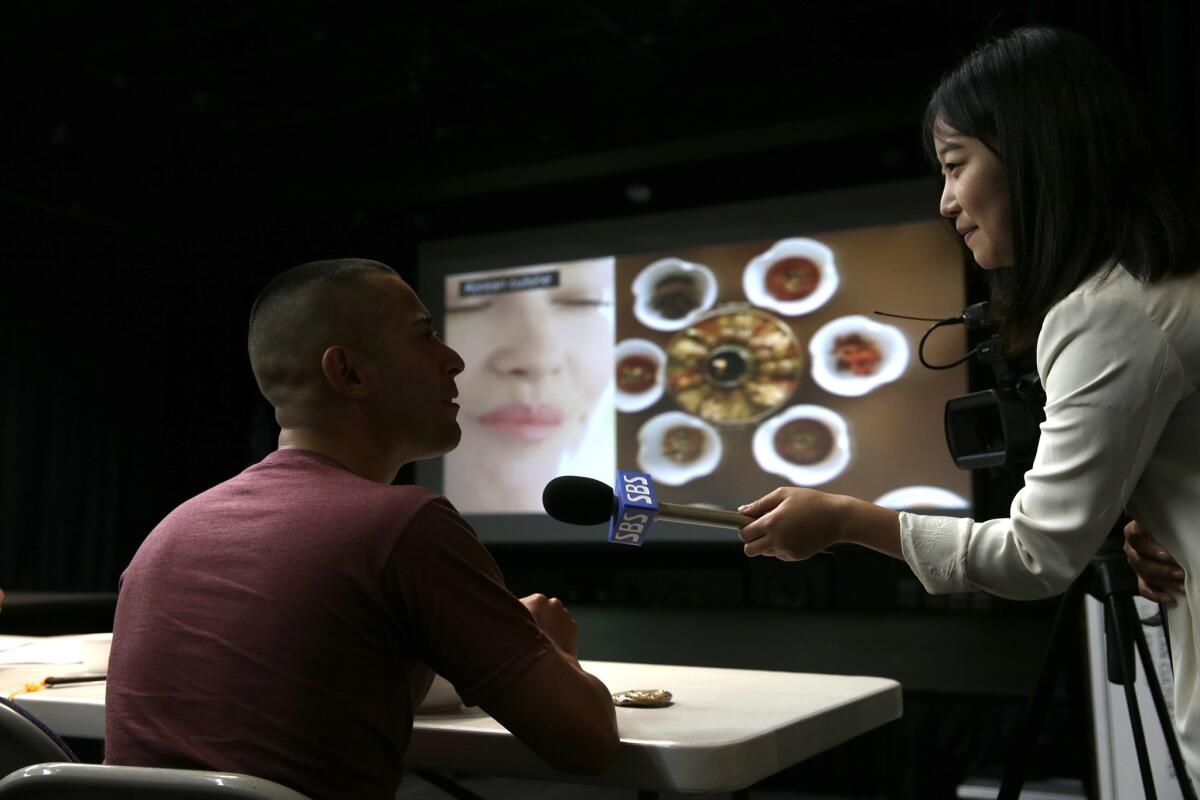For LAPD cops, walking the Koreatown beat filled with mystery, confusion, cultural minefields

- Share via
It’s a town where people don’t meet your gaze, first names are taboo, and piles of shoes greet you at the doorway. Lifelong friends get in nasty fights over who pays the check, and strangers won’t think twice before asking prying questions about your age or marital status. Here, sometimes yes means no and no means yes.
Trying to make sense of it? Forget it, rookie — it’s Koreatown.
About two dozen officers and detectives with the Los Angeles Police Department sat with quizzical looks on a recent Thursday at the Korean Cultural Center in the Mid-Wilshire area, as Professor Chan-Hie Kim walked them through Korean customs and cultural nuances that can befuddle outsiders.
Policing a city as diverse as Los Angeles means navigating cultural differences and linguistic hurdles in interacting with victims, witnesses or neighborhood regulars on the beat. In recent years, a volunteer group of Korean Americans and the Korean Cultural Center has been putting on classes for law enforcement to demystify Koreans and their singularities.

We are the protectors of the things they brought over here and built up.
— Commander Blake Chow, LAPD
“The knowledge you get today will just make your job easier,” Commander Blake Chow of the LAPD’s west bureau told the cops, none of whom were attending the daylong seminar voluntarily, having been assigned by the training coordinators in their respective divisions.
Chow recounted how as a patrol officer, he witnessed the burning and looting that devastated Koreatown during the 1992 riots. As a new officer with barely a year on the job, unfamiliar with the Korean immigrant community, he didn’t understand just how much work and sacrifice had gone into the businesses that were being destroyed, he told the officers.
“We are the protectors of the things they brought over here and built up,” he said, adding: “They love the police, trust me.”
Over the course of the day, the police got a taste of Korean food, fumbling with chopsticks to shovel bibimbap into their mouths — the dish is normally eaten with a spoon — got their tongues in a twist learning a phrase or two, and even sang a little karaoke at the South Korean government’s nifty tourism center next door.

They listened to lectures spanning the millennia of history on the Korean Peninsula leading up to the waves of immigration to Southern California, and discussed topics affecting life in Koreatown such as domestic violence, alcohol and mental health.
They also learned that staring directly into someone’s eyes is considered impolite, meaning an averted gaze doesn’t indicate deceit or evasiveness, and that people mostly address each other by title and last name. Because shoes are kept off indoors and stored by the front door, the presence of many pairs of shoes doesn’t necessarily mean a lot of people are inside the home.
And there’s the tricky matter of how negative questions are answered in the Korean language — in Korean, “You didn’t do it?” would be answered, “Yes, I didn’t do it,” or “No, I did do it.”
“If a Korean says later, ‘I meant no,’ please understand,” Chan-Hie Kim, a professor emeritus at the Claremont School of Theology, told the officers.
Hosted by the center but staffed and funded by volunteers, the “Korean-American Cultural Experience” for law enforcement has acculturated more than 1,300 LAPD officers since its inception in 2008. Recently, it has expanded to include personnel from the Los Angeles County Sheriff’s Department and officers from smaller police forces around the county.
Jason Lee, 68, one of the program’s organizers, said he remembered the acute feeling of powerlessness during the riots, watching the city in flames from his import-export business in a high-rise building near LAX. Until then, he and his fellow immigrants from South Korea had all kept their heads down, focusing only on making a living and building up their budding enterprises.
We had things we wanted to say to politicians and to the larger American society, but we had no one we could turn to...
— Jason Lee, Goodwill Cooperation Service volunteer
But in 1992, as he looked out onto his friends’ and acquaintances’ businesses being burnt to the ground, he realized how invisible they were in the city’s civic landscape. He wondered if more help would have come if Korean immigrants had been more engaged with the community around them, and the city’s leaders better acquainted with the builders of Koreatown.
“We had things we wanted to say to politicians and to the larger American society, but we had no one we could turn to,” Lee said. “I realized, we need to make ourselves better-known.”
In 1997, his volunteer group, the Goodwill Cooperation Service, started organizing trips to South Korea for various Angelenos — motley groups of teachers, social workers, political aides and police officials — hoping to bridge the cultural chasm and help the city understand its growing Korean American population. A decade later, based on the relationships with LAPD brass formed through those trips, they launched the cultural seminars for line officers to broaden their reach.
So what are officers’ impressions of Koreans? UCLA lecturer Jennifer Jung-Kim asked the room, starting the day’s second session: “Distinctive Korean Cultural Values and Behavior.”
“Smart.” “Proud.” “Private,” the officers yelled out.
“Carry a lot of cash,” someone said, drawing upon something professor Chan-Hie Kim mentioned earlier in the morning, to chuckles from the room.
Jung-Kim told the officers that because of the sometimes brutal actions of the military police under the authoritarian regime in the 1960s and 1970s and the colonial police under Japanese rule in the early 20th century, older Korean Americans may be fearful or suspicious of police. She also tried to dispel common stereotypes, explaining that Korean women, who may be perceived as quiet and submissive, actually hold the purse strings in most Korean households, and cautioning that the model-minority myth depicting all Asians as well-adjusted and successful can ignore and trivialize individual efforts, differences or problems.
Case in point, she said: Her own son isn’t doing so great in math.
“Believe me, I’d be thrilled if my kid got even a 90 in math,” she said.

Tony Garcia, a field training officer who has worked at the LAPD Olympic division since it first opened in 2009, said he had often encountered Koreans who were reluctant to call the police or get involved in other people’s business. He described being called out to a Koreatown home where neighbors reported commotion. They arrived to find a wife crying, bruises on her face and arms, but she told officers nothing had happened, he said. Garcia and his partner had no choice but to leave.
“It’s rare that the people involved call the police,” he said. Once you get Koreans to open up, though, they make good witnesses, Garcia said: “Either they tell the truth, or they don’t say anything.”
The day’s lessons, he said, would “help me talk to people, build a little rapport.”
Connie Chung Joe, executive director of Korean American Family Services, a nonprofit that provides domestic violence counseling and mental health services, gave the officers some insight into why Koreans may be more reluctant than others to report violence within the family.
More than 70% of the Koreans in the county are foreign-born, and more than half of Korean households are linguistically isolated, meaning no one 14 years old or older in the home speaks English fluently, she said. Victims are reluctant to come forward because they are concerned about the social stigmas attached with divorce and arrest, and fear they’ll hurt their children’s future prospects by making their family problems known, she said.
“You don’t air your dirty laundry in the Korean community,” Chung Joe said.
After the classes wrapped up in the late afternoon, the officers posed for a group photo – a must at most Koreatown events – and each went his or her own way, holding a certificate of completion and a colorful Korean fan as a souvenir.
“It’s like the police is investing in the Korean community,” Lee said of the seminar. “Perhaps they’ll act just a little bit different the next time they encounter a Korean person.”
ALSO
How a cop and his wife found peace after the Sandy Hook massacre
Overturned big rig on Highway 14 creates miles-long traffic jam
Theresa Saldana, actress in ‘Raging Bull’ and ‘The Commish,’ dead at 61
Follow me on Twitter @vicjkim
More to Read
Sign up for Essential California
The most important California stories and recommendations in your inbox every morning.
You may occasionally receive promotional content from the Los Angeles Times.











